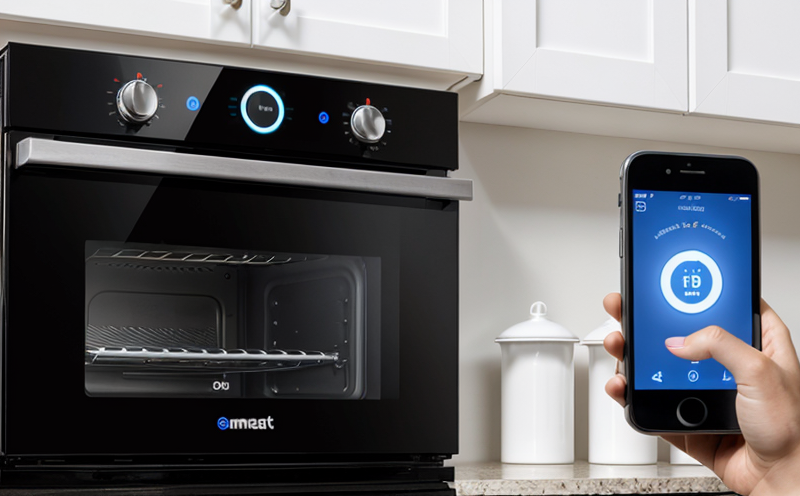IEC 60335-2-107 Safety and Reliability Testing of Smart Ovens
The International Electrotechnical Commission (IEC) standard, IEC 60335-2-107, is a crucial document that sets forth the safety requirements for household appliances with heating elements. This standard is widely recognized in the global market and is essential for ensuring consumer protection and product reliability. Smart ovens are no exception to this stringent requirement, as they integrate advanced technology into traditional kitchen appliances.
The IEC 60335-2-107 covers various aspects of safety testing including electrical insulation, mechanical stability, thermal management, and electromagnetic compatibility (EMC). Compliance with these standards ensures that smart ovens do not pose a risk to users or the environment. These tests are critical for manufacturers who wish to ensure their products meet international quality benchmarks.
The testing process involves several stages where each step is designed to evaluate different aspects of safety and reliability. During the initial phase, the oven undergoes a thorough inspection of its electrical components to ensure they comply with the standard specifications. This includes checking insulation resistance and verifying that all circuits are properly grounded. Mechanical stability tests assess whether the oven can withstand various environmental conditions without compromising performance or safety.
Thermal management is another key area tested under IEC 60335-2-107, as overheating could lead to potential hazards. Engineers subject smart ovens to simulated usage scenarios that replicate typical household settings such as high ambient temperatures and extended cooking times. The goal here is to ensure the oven maintains safe operating temperatures while maintaining efficiency.
Electromagnetic compatibility (EMC) testing evaluates how well the oven operates in an electromagnetic environment without causing interference with other electronic devices. This ensures smart ovens function seamlessly alongside Wi-Fi routers, Bluetooth speakers, and other household gadgets. EMC compliance is particularly important given the prevalence of interconnected home systems where seamless connectivity between devices is essential.
Once all tests are completed successfully, manufacturers receive certification confirming their product meets IEC 60335-2-107 standards. This certification not only enhances brand reputation but also opens up markets in countries that mandate adherence to these international norms. By undergoing rigorous testing according to this standard, smart oven manufacturers can ensure they produce safe, reliable products that meet consumer expectations and regulatory requirements.
In conclusion, IEC 60335-2-107 safety and reliability testing is vital for ensuring the quality and longevity of smart ovens. It provides peace of mind to consumers knowing their appliances have undergone extensive scrutiny before reaching store shelves. Moreover, this certification plays a significant role in fostering trust between manufacturers and buyers worldwide.
- Ensures compliance with international standards
- Promotes consumer safety
- Enhances product reliability
- Fosters market access through recognized certifications
- Encourages innovation by setting benchmarks for quality
Why Choose This Test
- Mandated by international regulations in many countries
- Guarantees consumer safety and satisfaction
- Ensures product reliability throughout its lifecycle
- Fosters market access through recognized certifications
- Promotes innovation by setting benchmarks for quality standards
- Reduces liability risks associated with non-compliance
- Simplifies regulatory compliance across different jurisdictions
- Enhances brand reputation and customer confidence
Quality and Reliability Assurance
The rigorous testing processes outlined in IEC 60335-2-107 play a crucial role in maintaining the highest level of quality and reliability for smart ovens. By adhering to these standards, manufacturers can ensure their products consistently meet or exceed industry expectations.
One key aspect is the continuous monitoring and updating of manufacturing processes based on feedback from successful test runs. This approach helps maintain consistent performance across all units produced. Additionally, regular audits by independent bodies help verify ongoing compliance with IEC 60335-2-107 standards.
Manufacturers who comply with these rigorous testing protocols benefit from enhanced brand reputation and increased customer satisfaction. These factors contribute significantly to long-term business success in competitive markets.
International Acceptance and Recognition
The acceptance of IEC 60335-2-107 standards extends far beyond national borders, making them an essential part of global trade. Many countries recognize these standards as a benchmark for quality assurance in household appliances.
In the European Union (EU), compliance with IEC standards is often a legal requirement. In other regions like North America, while not mandatory, adherence to international norms such as this can still provide significant advantages. For instance, demonstrating rigorous testing procedures can mitigate concerns about product safety and reliability among potential buyers.
The widespread adoption of these standards also promotes interoperability between different brands and models within the same category. This fosters a more cohesive ecosystem where consumers have access to a broader range of compatible products without worrying about compatibility issues.





